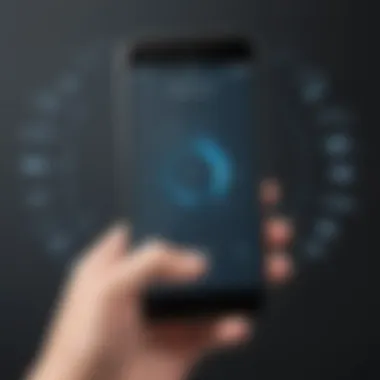A Comprehensive Guide on How to Record Phone Calls While Talking


Product Overview
When delving into the intricacies of recording phone calls during a conversation, it becomes indispensable to explore various methods and techniques tailored to different devices and operating systems. The allure of this process lies in its ability to preserve important conversations for future reference or legal matters. It is not solely about documenting words exchanged but delving into the nuances of effective communication capture. This intricate process demands a keen eye for detail and a knack for technological exploration tailored to the needs of the users.
Performance and User Experience
Embarking on the journey of recording phone calls during live discussions unveils a realm of technological prowess, enveloping users in a tapestry of options such as built-in functionalities or third-party applications. Testing the waters of these methods allows users to gauge the efficiency and legal implications underlying call recordings. Understanding user experience involves delving into ease of use, audio quality, and the seamless integration of these recording tools into daily communication. By skimming past the surface, users can unearth hidden gems that enhance the efficacy of call recording without sacrificing user convenience or ethical considerations.
Design and Build Quality
As conversations unfold, the efficiency of call recording tools is married to the design architecture and durability of the technology supporting this feature. The essence of this section embodies a holistic analysis of the materials used, aesthetic appeal, and ergonomic considerations that influence the recording process. Hence, the blend of functionality and design synergizes to offer users a robust tool that seamlessly integrates into their communication milieu, epitomizing a harmonious fusion of utility and visual appeal.
Technology and Innovation
Revolutionizing traditional phone call recording methods, technological innovations have paved the way for groundbreaking features that redefine this landscape. Exploring these cutting-edge technologies allows users to glimpse into the future of call recording, predicting trends that may influence the broader consumer tech industry. The impact of these innovations transcends mere recording capabilities, offering users a glimpse into the evolving nature of telephonic communication and the intrinsic value of preserving conversations.
Pricing and Value Proposition
At the intersection of technology and affordability lies the value proposition of call recording tools. Comparing pricing details, affordability, and the competitive landscape enables users to make informed decisions regarding the investment in such tools. Recommendations and verdicts arising from this section strive to provide users with clarity on the cost-benefit analysis of call recording mechanisms, ensuring that value and utility intersect seamlessly to cater to the user's needs.
Introduction
In a world where communication plays a pivotal role in personal and professional interactions, the ability to record phone calls while conversing serves as a valuable tool for various purposes. This article delves into the intricate process of capturing phone conversations seamlessly across different devices and operating systems. Understanding the nuances of call recording is crucial for maintaining accurate records, enhancing productivity, and resolving disputes effectively. By exploring a range of techniques and methods, readers will be equipped with the knowledge needed to navigate the complex landscape of phone call recording.
Understanding the Need to Record Phone Calls
The need to record phone calls stems from a myriad of reasons, ranging from legal requirements to personal documentation purposes. Individuals and businesses often seek to preserve important conversations for future reference or legal protection. By recording phone calls, one can ensure clarity of information exchanged, verify agreements made, and capture essential details that may slip from memory. Additionally, phone call recordings serve as valuable assets in resolving misunderstandings, corroborating facts, and analyzing communication patterns. Understanding the necessity of call recordings underscores the significance of maintaining accurate and comprehensive records in today's fast-paced world.
Legal Implications of Recording Phone Conversations
Recording phone conversations carries significant legal implications that must be carefully considered and adhered to in compliance with relevant laws and regulations. The legality of call recording varies by jurisdiction, with some regions requiring explicit consent from all parties involved before a conversation can be recorded. Failing to comply with legal requirements can lead to severe consequences, including legal penalties and breach of privacy laws. It is imperative for individuals and organizations to familiarize themselves with the legal framework surrounding call recording to ensure ethical and lawful behavior. By upholding legal standards and respecting privacy rights, individuals can leverage phone call recordings responsibly while mitigating potential risks and liabilities.


Recording Phone Calls on Android Devices
In this comprehensive guide on how to record phone calls while talking, the section focusing on Recording Phone Calls on Android Devices holds significant importance due to the widespread use of Android smartphones globally. Android devices offer a diverse range of features and functionalities, including the ability to record phone conversations directly on the device, making it a pertinent topic for discussion. By exploring the methods and techniques specific to Android phones, readers will gain insights into how they can effectively capture and store important phone calls for various purposes.
Using Built-in Call Recording Features
When it comes to recording phone calls on Android devices, utilizing the built-in call recording features provides a convenient and seamless experience for users. These native features, often integrated into the phone dialer or settings menu, allow users to initiate recording during a call without the need for third-party applications. By discussing the steps to activate and utilize these built-in functionalities, readers can harness the full potential of their Android devices for call recording purposes. Additionally, highlighting the benefits of using these native features, such as ease of access and reliability, will showcase the practicality of leveraging what the device already offers.
Exploring Third-Party Apps for Call Recording
Apart from built-in features, another avenue for recording phone calls on Android devices involves exploring third-party applications tailored for this specific purpose. These apps offer additional functionalities and customization options that may not be available in the device's native call recording feature. By delving into the diverse range of third-party apps available on the Google Play Store, readers can discover alternative methods for recording phone conversations that cater to individual preferences and requirements. Discussing the key features, privacy considerations, and user reviews of popular call recording apps will provide readers with valuable insights to make informed decisions when selecting and using third-party applications for call recording on their Android devices.
Recording Phone Calls on i
OS Devices
In the realm of this expansive guide on how to record phone calls while engaged in conversation, delving into the specifics of recording phone calls on i OS devices offers a crucial vantage point. As iOS devices, such as iPhones and iPads, are prevalent in the market, understanding how to effectively record phone conversations on these gadgets becomes paramount. Given the stringent privacy and security features embedded within iOS systems, the method and tools used for call recording on these devices present peculiar challenges and unique solutions.
For tech-savvy individuals seeking to efficiently capture phone conversations on their i OS devices, the utilization of third-party apps emerges as a standout approach. These apps, tailored specifically for iOS systems, circumvent the limitations posed by Apple's native functionalities, providing enhanced flexibility and features for recording calls. By embracing these third-party applications, users can transcend the conventional boundaries set by iOS' inherent restrictions, enabling them to achieve seamless and comprehensive call recording experiences.
Incorporating third-party apps for call recording on i OS devices not only amplifies the recording capabilities but also diversifies the options available to users. Through these applications, individuals can access advanced settings, recording formats, and organizational tools that streamline the call recording process. Moreover, the integration of third-party apps can facilitate seamless synchronization with cloud services, ensuring secure storage and convenient access to recorded conversations across multiple devices.
When navigating the realm of call recording on i OS devices, considerations regarding the compatibility, legality, and user experience of third-party apps warrant meticulous attention. Opting for reputable and verified applications from the App Store can safeguard users against data breaches and privacy violations, reinforcing ethical and legal compliance in the recording process. By understanding the mechanisms of these third-party apps and leveraging their functionalities judiciously, individuals can harness the full potential of iOS devices for recording phone calls with precision and proficiency.
Recording Phone Calls on Windows Devices
In the realm of telecommunication and digital interactions, recording phone calls on Windows Devices stands as a pivotal aspect that warrants meticulous attention. Amidst the diverse landscape of operating systems and devices, Windows Devices offer a unique platform for capturing and retaining important conversations. This section delves into the nuanced world of Windows Devices, shedding light on the significance of recording phone calls within this ecosystem.
The relevance of this topic in the broader context of this article lies in its detailed exploration of recording methodologies across various devices and operating systems. By focusing specifically on Windows Devices, readers are provided with a comprehensive understanding of the distinct elements, benefits, and considerations associated with recording phone calls on this particular platform.
Options for Recording Calls on Windows


When it comes to options for recording calls on Windows, users are presented with a range of tools and techniques that cater to diverse needs and preferences. From built-in functionalities to third-party software solutions, the possibilities are vast and varied.
One commonly utilized method for recording calls on Windows Devices involves leveraging built-in features such as voice recording applications or native call recording functionalities, if available. These inherent tools offer a seamless and integrated approach to capturing phone conversations without the need for external software.
Alternatively, users can explore the realm of third-party apps specifically designed for call recording on Windows Devices. These applications often offer advanced features and customizable settings, allowing individuals to tailor their recording experience according to specific requirements.
By elucidating these diverse options for recording calls on Windows Devices, individuals gain valuable insights into the practical avenues available within this domain, empowering them to make informed decisions based on their unique preferences and objectives.
Recording Phone Calls on mac
OS Devices ###
In the realm of this comprehensive guide on how to record a phone call while engaged in conversation, the section focusing on Recording Phone Calls on mac OS Devices comes forth as a crucial domain for those using Apple's operating system. Mac users often find themselves in need of a methodical approach to record important phone conversations for various reasons. With macOS being a preferred choice for many professionals and creatives, the ability to document phone calls directly on their devices presents a seamless and convenient solution that aligns with the seamless Apple ecosystem.
When delving into the core aspects of Recording Phone Calls on mac OS Devices, we uncover a myriad of benefits and considerations. Firstly, the seamless integration of software and hardware in Apple products ensures that recording phone calls on macOS is highly optimized and efficient. The sophisticated technology within macOS devices enhances the recording quality, offering users clear and crisp audio files for future reference or documentation. Moreover, the privacy and security features embedded in macOS provide users with a sense of confidence that their recorded conversations are safely stored and protected within the device's ecosystem.
Methods for Recording Calls on mac
OS ###
Exploring the methodologies for Recording Calls on mac OS unveils a spectrum of approaches tailored to suit diverse user preferences. One prevalent method involves utilizing third-party applications that are specifically designed to facilitate phone call recording on macOS devices. These applications offer a user-friendly interface, allowing users to initiate, pause, or stop recordings seamlessly during phone conversations. Additionally, users can benefit from advanced features such as customizable recording settings, file organization options, and easy sharing capabilities, enhancing the overall recording experience.
Alternatively, for users seeking a more straightforward approach, mac OS provides built-in features that enable users to record phone calls without relying on external applications. By leveraging the in-built Voice Memos app or QuickTime Player, users can initiate recordings with a few simple clicks, eliminating the need for third-party software. These native recording features offer a hassle-free solution for capturing phone conversations effortlessly, making it ideal for users who prefer a minimalist approach to call recording on macOS.
Legal Considerations for Recording Phone Calls
In this digital age, the ability to record phone calls has become increasingly accessible, leading to a surge in its usage for various purposes. However, amidst this convenience lies a crucial aspect that cannot be overlooked - legal considerations. Understanding the legal framework surrounding phone call recording is imperative to avoid potential legal repercussions. By delving into the legal considerations for recording phone calls, individuals can navigate this technological terrain while remaining compliant with the law.
Legal considerations encompass a wide array of factors, ranging from consent requirements to privacy laws. One of the fundamental elements to grasp is the concept of express consent. In many jurisdictions, recording a phone call without the explicit consent of all parties involved is deemed illegal. This underscores the significance of obtaining permission before initiating any recording. Additionally, being aware of the specific privacy laws governing call recording within your region is essential for maintaining legality and ethical conduct.
Furthermore, legal considerations play a crucial role in safeguarding individuals from potential privacy violations and legal disputes. By adhering to established legal guidelines, individuals can mitigate the risks associated with unauthorized recording and ensure that their actions align with legal standards. Additionally, understanding the legal framework provides a sense of clarity and guidance, enabling individuals to make informed decisions regarding phone call recording practices.


Understanding Consent and Privacy Laws
Within the realm of legal considerations for recording phone calls, understanding consent and privacy laws occupies a central position. Consent serves as a cornerstone in the ethical recording of phone conversations, requiring all parties involved to be fully informed and agree to the recording. Without obtaining explicit consent, recording a phone call may infringe upon the privacy rights of individuals and violate legal statutes.
Consent laws vary across different jurisdictions, with some regions mandating the need for all parties to consent to the recording, while others may allow single-party consent. It is essential for individuals to familiarize themselves with the consent laws applicable in their location to ensure compliance and avoid potential legal consequences. Additionally, respecting the privacy rights of individuals is paramount, as unauthorized recording can lead to breaches of confidentiality and trust.
By adhering to consent and privacy laws, individuals demonstrate their commitment to ethical conduct and legal compliance. Upholding these standards not only fosters trust and integrity in interactions but also safeguards individuals from legal liabilities and ethical dilemmas.
Best Practices for Ethical Phone Call Recording
Ethical considerations play a pivotal role in determining the practices for recording phone calls responsibly. In the realm of communication ethics, maintaining transparency, respect for privacy, and integrity are paramount when engaging in call recording activities. Adhering to best practices ensures that individuals uphold ethical standards and legal requirements in their recording endeavors.
One of the key best practices for ethical phone call recording is to inform all parties involved about the recording at the beginning of the call. This transparent approach not only fosters trust and honesty but also ensures compliance with consent laws. Additionally, it is crucial to use recorded information responsibly and only for lawful purposes, respecting the confidentiality and privacy of the recorded conversations.
Furthermore, securely storing and managing recorded calls is essential to prevent unauthorized access and maintain data integrity. Implementing appropriate security measures ensures that recorded conversations remain protected from breaches and adhere to data privacy regulations. By following these best practices, individuals can engage in phone call recording ethically and responsibly, promoting trust and accountability in their communication practices.
Tips for Effective Phone Call Recording
In the realm of phone call recording, understanding the nuances of efficient recording practices plays a pivotal role in ensuring a seamless and informative conversation capture. The significance of effective phone call recording techniques transcends mere documentation, delving into the realm of clarity, accuracy, and professionalism. By paying heed to tips for effective phone call recording, individuals can elevate the quality of their recordings, whether for personal reference, business communication, or legal matters. These tips encompass a myriad of facets, ranging from technological considerations to etiquette and legality, all converging towards optimized recording outcomes.
Ensuring Clear Audio Quality
When delving into the intricacies of phone call recording, a paramount aspect that cannot go unnoticed is the audio quality. Ensuring crystal-clear audio transmissions not only enhances the listening experience but also facilitates efficient communication comprehension and documentation. Factors influencing audio quality include network connectivity, device specifications, background noise levels, and microphone sensitivity. By meticulously optimizing these variables, individuals can heighten the overall clarity and fidelity of recorded conversations, ensuring that no crucial details slip through the cracks due to poor audio quality.
Managing Storage Space for Call Recordings
Another fundamental consideration in the realm of phone call recording revolves around the prudent management of storage space. Given the voluminous nature of recorded conversations, maintaining an organized and efficient storage system is imperative to avoid data loss and to streamline accessibility. Effective storage management strategies encompass categorization, archival protocols, backup mechanisms, and utilization of cloud storage services. By judiciously implementing these storage practices, individuals can safeguard their recorded conversations, facilitate easy retrieval when needed, and optimize space utilization to accommodate an extensive archive of phone call recordings.
Conclusion
Phone call recording is a crucial aspect in today's digital communication landscape, enhancing productivity and ensuring accurate information retrieval. In this comprehensive guide, we have delved deep into the various methods and techniques available for recording phone calls while in conversation. Understanding the legal implications is paramount to conducting ethically sound recording practices.
Summary of Phone Call Recording Techniques
Exploring the vast array of options for recording phone calls, we have covered built-in features, third-party apps, and specific methods for different devices and operating systems. Readers have gained valuable insights into the practical aspects of call recording, enabling them to make informed decisions regarding the most suitable approach for their needs.
Final Thoughts on Responsible Call Recording Practices
Responsible call recording practices go beyond simply capturing conversations; they encompass ethical considerations, consent, and privacy laws. It is essential to prioritize transparency, respect for individuals' privacy, and adherence to legal guidelines when recording phone calls. By upholding ethical standards and best practices, individuals can leverage call recording as a tool for constructive communication and factual documentation.



